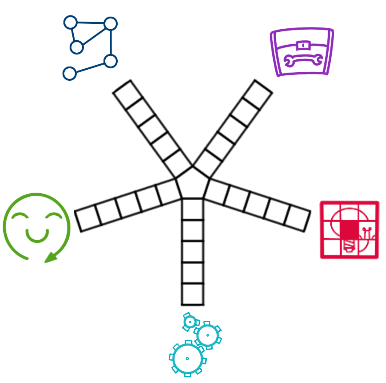Or search by topic
Number and algebra
Geometry and measure
Probability and statistics
Working mathematically
Advanced mathematics
For younger learners
Published 2020
Nurturing Successful Mathematicians
Our latest features for primary and secondary students have been inspired by the Strands of Mathematical Proficiency model introduced by Kilpatrick et al (2001). This 'rope model' has informed the way we design NRICH tasks, and we often use it in professional development workshops with teachers, drawing attention to the importance of a balanced curriculum which develops all five strands of students' mathematical proficiency equally, rather than promoting some strands at the expense of others.
We have developed a new model and image which uses child-friendly language, so that teachers and parents can share with students five key ingredients that characterise successful mathematicians. At NRICH, we believe that learning maths is about much more than just learning topics and routines. Successful mathematicians understand the curriculum content and are fluent in mathematical skills and procedures, but they can also solve problems, explain their thinking and have a positive attitude about themselves as learners of mathematics.

Understanding - Maths is a network of linked ideas. I can connect new mathematical thinking to what I already know and understand.
Tools - I have a toolkit that I can choose tools from to help me solve problems. Practising using these tools helps me become a better mathematician.
Problem solving - Problem solving is an important part of Maths. I can use my understanding, skills and reasoning to help me work towards solutions.
Reasoning - Maths is logical. I can convince myself that my thinking is correct and I can explain my reasoning to others.
Attitude - Maths makes sense and is worth spending time on. I can enjoy Maths and become better at it by persevering.
The publication of this new model, inspired by Kilpatrick et al. (2001), and the activities in the accompanying features, comes at a very interesting time for education. In the midst of a global pandemic, children and young people around the world are finding their mathematics education disrupted as schools are partially or totally closed. Teachers are coming up with innovative ways to keep their classes engaged, and parents are doing their best to support their children's learning at home while juggling the many other demands of modern life. Ever present is the worry that many learners will be disadvantaged by the disruption, and we need to do everything we can to make sure they are in a position to bounce back once schools return to normal.
At NRICH, we believe that central to the success of settling back into schools is recognising and acknowledging the maths learning that has been achieved at home, and encouraging learners to reflect on how they see themselves as mathematicians. It may be that some learners will not recognise the value of what they have achieved while they have been out of the classroom, because what they have been doing at home may be quite different from what they usually do in school. We want learners to appreciate that there are many ways to demonstrate their mathematical capabilities, and to recognise the ways in which they behave mathematically. You may be interested to read What We Think and Why We Think It at Primary and Secondary to find out more about the research that informs our thinking and the development of our resources. Perhaps most importantly, we want learners to feel positive about themselves as learners of mathematics. The article Getting into and staying in the Growth Zone makes the case that resilience is the key to tackling anxiety about mathematics, which will surely be heightened by the stress of the current global situation. By inviting children and students to assess their mathematical progress on a broad range of measures, we hope to change the narrative to recognise what learners have achieved, rather than focussing on what they have missed.
With this in mind, we have created this self assessment tool to help learners recognise where their mathematical strengths and weaknesses lie. All of the activities in the accompanying features are designed to offer learners opportunities to develop their mathematical capabilities in multiple strands. We hope learners will have a go at some of the activities and then take time to reflect on their own mathematical capabilities, so that when they return to school they are ready to share with their teacher the excitement about what they have achieved, and are eager to continue on their mathematical journeys.
Ref: Kilpatrick, J., Swafford, J. and Findell, F. (eds) (2001) Adding It Up: Helping Children Learn Mathematics. Mathematics Learning Study Committee: National Research Council.

